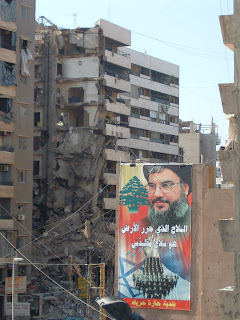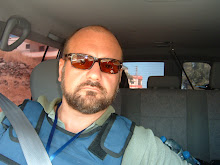 This is the first of a series of posts regarding my professional career and my field security experiences in different countries.
This is the first of a series of posts regarding my professional career and my field security experiences in different countries.I accepted a challenging assignment offered by an International Organization the day just after the beginning of the conflict between Israel and Hezbollah (a Shi'a Islamist political and paramilitary organization based in Lebanon), July 13th 2006. I was requested, as Senior Field Security Officer, to go on site and perform a security mission which would have been organized from scratch.
The Organization, in fact, closed the local office few years prior the beginning of the conflict. A huge logistic/humanitarian assistance operation was arranged virtually round the clock.
I accepted the challenge, got an entry vista at the Syrian Embassy the following day and flow to Damascus where I spent three days since Lebanon had all land access points closed. Finally, the only open way in to Lebanon was through the northern town Al Aarida, bordering with Syria.
As soon as I arrived in Beirut I joined other security professionals coming from the US, New Zealand, Australia, etc. We started a new security office within the Organization structuring operations according with humanitarian relief activities intended to transport/distribute food to the populations affected by the conflict. The task was successful nevertheless not risk free.
Particularly, I assessed the security conditions at micro and macro level. After strategizing with the team about best security options to adopt according with the evolution of the conflict, I went on the ground assessing security of public infrastructures (roads, bridges, logistic activities, assets, etc) double-checking and crossing security info.
Furthermore, I organized and provided security to convoys from the Beirut port to southern Lebanon and Beeka Valley locations still under armed Hezbollah control. Both parts involved in the armed conflict were looking at us with skepticism because the Organization was providing humanitarian assistance to the population trapped in the war and when one is “neutral” is treated with suspicion.
The most challenging operation, by the way, it has been the one carried out during a technical communication operation. I was escorting a group of ICT engineers to the top of a mountain facing the Beeka valley while harsh wide battle was taking place. We had been granted by Israeli Defence Forces (IDF) access to the area while an intense IDF artillery fire was hammering from the bottom the mountain where we were operating. Yes we had a clearly marked (armored) vehicle and security clearance but nervousness among staff was perceived.
The artillery fire was closed but the engineers succeeded to re
 place the repeater rapidly and we abandoned the site using an alternative route.
place the repeater rapidly and we abandoned the site using an alternative route.Beirut represents to me a milestone as security professional. I had the chance to apply some lessons previously learned during my military career. The international environment created among us and our team spirit helped to face up the rapid evolution of events as well as the escalation of the conflict.
The war continued until a United Nations-brokered ceasefire went into effect on August 14, 2006. Hezbollah was responsible for thousands of Katyusha rocket attacks against Israeli civilian towns and cities in northern Israel, which Hezbollah claimed were in retaliation for Israel's killing of civilians and targeting Lebanese infrastructure. In the fighting 1,200 Lebanese and 158 Israelis were killed. Of the dead almost 1,000 Lebanese and 41 Israelis were civilians.
Reached the peace, I concluded my mission and left to South America to conduct other RSAs. I love Lebanon, its people and the magic atmosphere!

Hezbollah bunkers in the proximity of the Litani River.
Visiting a community in the surroundings of Baalbek.
Just after a shelling.


















No comments:
Post a Comment